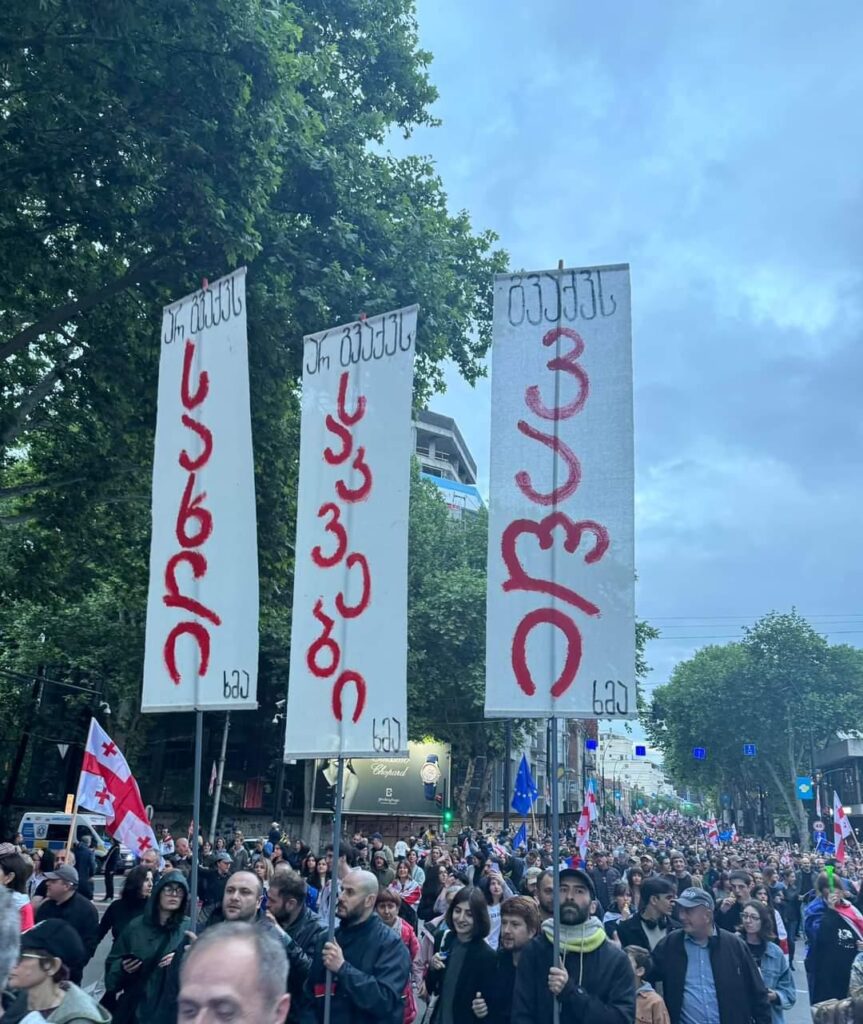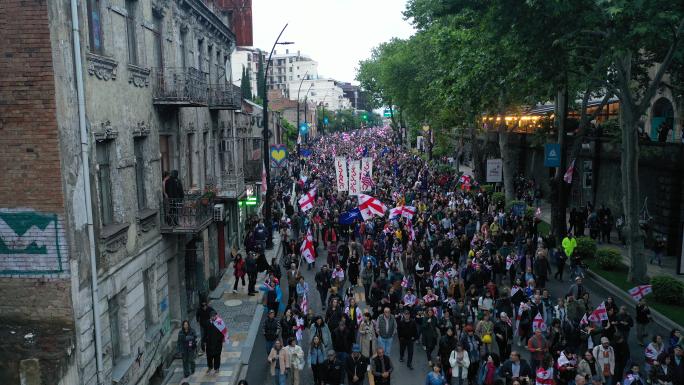“Khma” (voice in Georgian) is a socialist collective from Georgia, formed in 2021, with the aim to push class-related issues into the public discourse and to organize people around them. In the past 3 years Khma has been campaigning in Georgia to expose the pharmaceutical ‘mafia’, to research fraudulent pension loan schemes from banks, to fight forced evictions and to demand universal free meals at public schools. Throughout this period, Khma actively supported various workers’ movements, such as the strikes of Chiatura miners or Sairme workers.
ISp spoke with Giorgi Kartvelishvili, a member of the Khma movement
Giorgi, recently there have been a lot of news about the mobilisations in Georgia against the “foreign agents law”. Can you tell us what is your approach towards this law? What exactly does it represent and what is behind this controversy?
“Foreign agents law” (officially “the Law on Transparency of Foreign Influence”), re-initiated by the ruling party the Georgian Dream (GD) after the failed attempt in March 2023, requires non-commercial non-state organizations as well as independent media who receive 20% or more of their income from foreign sources to register in a special state registry of “organizations under the influence of foreign powers”. Legislation draws similarities to the laws that are operating in Russia and Belarus, and the one that was recently adopted in Kyrgyzstan. Moreover, the law gives rights to the Ministry of Justice to monitor and request any kind of information, including personal data, on the basis of the “decision of a relevant authorized person in the Ministry of Justice” or “written application submitted to the Ministry of Justice”— in other words, denunciation.
The law is often compared to the Russian legislation on foreign agents adopted in 2012, despite the fact that the law in Russia is much more oppressive and overearching as a result a of series of amendments during the past 12 years, e.g. since 2021 it applies to both individuals and organizations, and it is not about funding any more, but much more vague and ambiguous “foreign influence”. The general fear is that in our case, the same direction is already set if the law gets adopted, although the initial draft is already very problematic and dangerous.
In short, this law threatens not only those big western liberal NGOs operating in Georgia (as conservatives, and unfortunately many leftists often claim), but any kind of action and critique against the policies of the GD party, including grassroots movements, free media organizations or independent labour unions. The primary underlying goal is to maintain and strengthen the monopoly control over the state. The current authoritarian turn is the manifestation of such project.

It seems that this law has triggered a big response from the Western camp (the US and EU). The Georgian prime minister has even said that he received covert death threats from an EU commissioner, while US officials have made strong statements. How do the developments fit in the battle for domination between the US and China-Russia?
The ongoing confrontation between the GD party and their western counterparts in the US and EU is quite evident. The fact that Georgia (and the entire South Caucasus region) is within the geopolitical interests of major powers is also important in analyzing the situation. Georgia lies on the shortest land trade route between EU and China i.e. the Middle Corridor, which is currently under development. Moreover, there are important energy projects under construction that will pass through Georgia and which is quite crucial for Europe’s energy security. The GD party knows this very well and relies on it while pursuing an aggressive foreign policy. On the other hand, to me it is not yet fully clear whether the GD is ready to fully abandon the EU/NATO integration agenda, although there are signs of it.
Can you tell us a bit more about the protests? What social layers take part in them? What is their organizational form, if any? What is the general feeling that prevails?
Protests have been going on for two months already and their composition is quite diverse. The movement is not centrally organized, especially after its beginning period. Different social groups take part in the protest at different places: university and high school students, members of the academia, civil society groups, public school teachers, artist communities, various middle- and low-income urban workers, such as couriers or other workers in the “gig economy”, etc.
The general feeling is that something very dangerous is looming on the horizon. This feeling is constantly aggravated by the GD leaders’ rhetoric, official propaganda and all the measures to weaken the protests – threats, lies, intimidation and physical violence.
What is the approach of the Khma movement towards these protests? What are your proposals on how to move forward?
I our view, the protest has to expand in its content and absorb progressive, class-based demands. “Yes to Europe, no to Russia” is a catchy and popular slogan, but the movement has to also decide and define what does it exactly mean. Georgia is an extremely unequal country as a result of decades of hard neoliberal reforms. Therefore, we can easily imagine Georgia, as a part of Europe, where the living and working conditions of the majority of its population is not improved. We think, merging class and national interests is the only way to move forward.
How do you deal with the pro-western trend within the protest movement?
You are completely right that there is a strong general pro-western sentiment among the protesters. It is also true that this pro-western stance in post-soviet countries often goes into a naive direction of idealization. We think, we should give precise definition of “Europe” beyond the idealization. There are in fact many definitions and dimensions of “Europe”. On a contemporary political and ideological level, that also includes neoliberal or populist right-wing Europe. However, most importantly, we see value in the European legacy of centuries of working-class struggle with all its achievements. I think, that’s what’s worth focusing on when we talk about Europe here, not only within these protests, but in the future as well.



